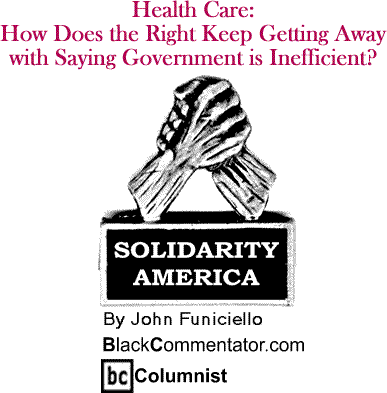
|
|||||||||||||||||||||||

|
|

Custom Search
|
|
 |
|
Many
years ago, there was a meeting in Now we know that this improvement in the existing system never came to pass and we find ourselves with health care that leaves 47 million without access to health care and probably another equal amount with inadequate health care. It’s like the unemployment figures from the federal and state governments: if the official rates are doubled, that probably comes close to the actual rate. For years, the official rate did not count those who had outlasted their unemployment benefit and either had given up looking for work (therefore, not counted as unemployed) or had taken a job at a quarter or a third of the previous pay (not counted as unemployed) or were working part time at a much lower rate of pay. So it is with health insurance. Millions of people think they are covered by either a plan they pay for directly or by a plan they get from the employer, usually paying some part of the premium. These are the people who, when they try to use the insurance, find that it is inadequate for the problem or sickness they have and, very often, they are forced into bankruptcy because they can’t pay for an operation or treatment that costs beyond their insurance coverage. No one who works full time and believes he or she has health insurance should be forced to pay out of pocket. But that’s how untold numbers of young people have been forced into bankruptcy. It never should happen. Amazingly,
workers with this level of health insurance - that is, it is adequate
insurance if you never become seriously ill or injured - are not
included in the statistics of those without health insurance. They
should be, so the number of those with no health care coverage or
inadequate coverage could be as high as one-third of the You
can see that
That leaves us asking what kind of society and nation we’ve become, because the arguments that we hear today coming out of the mouths of Republicans in Congress and elsewhere are essentially the same as they were during the early days of the Cold War, the time of McCarthyism. The Democrats, after a half-century, are held off by the same fears that caused them to back off from full universal health care. They don’t want the Republicans to call them socialists. It
doesn’t matter to them that the For
some, our lack of health care for all has come to be like the weather…it’s
just there and nothing can be done about it. For others, it is a
matter of ideology - universal single-payer health care would just
be another step toward socialism, even communism! Never mind that
not even the Tories in Rep. John Conyers, D-Mich., has introduced HR 676, Expanded and Improved Medicare for All, which would cover everyone for all of their health needs, including dental, prescription drugs, and long-term care. It would be paid for by the savings that would come from taking the profit out of the current system.
“I don’t know,” he said. Well, it’s 2009 and there’s still no answer. Fact is, opponents keep saying the same things they’ve said for 50 years and we’re no closer to universal coverage, except for HR 676 (which has 90 co-sponsors in the House). We’re still told today that the country isn’t ready for it, but polls show that the people are overwhelmingly ready - it’s just that the politicians, corporate lobbyists, and other powers are not ready for it. The lie keeps being repeated, that “government can’t do it…only the private sector can do it.”
The financial sector plunge is about to take the country with it. It’s time to stop listening to the addled brains of public life whose mantra is, “small government or no government…that’s the solution to all of our troubles.” We don’t need the government for everything, but we need it for many things. Universal, single-payer health care is one of those vital things. We can’t afford to leave it in the hands of the private insurance industry another day. BlackCommentator.com Columnist, John Funiciello, is a labor organizer
and former union organizer. His union work started when he became
a local president of The Newspaper Guild in the early 1970s. He
was a reporter for 14 years for newspapers in |
|
Any BlackCommentator.com article may be re-printed so long as it is re-printed in its entirety and full credit given to the author and www.BlackCommentator.com. If the re-print is on the Internet we additionally request a link back to the original piece on our Website. Your comments are always welcome. eMail re-print notice
If you send us an eMail message we may publish all or part of it, unless you tell us it is not for publication. You may also request that we withhold your name. Thank you very much for your readership. |
|
| |
|
| March
5 , 2009 Issue 314 |
|
| Executive Editor: Bill Fletcher, Jr. |
| Managing Editor: Nancy Littlefield |
| Publisher: Peter Gamble |
| Est. April 5, 2002 |
Printer Friendly Version
in resizeable plain
text format or pdf
format. |
| Frequently Asked Questions |
 |

|
 |
 |
 |
| |
| |






























 We’ve
come a long way from the earliest proposals for universal coverage
for health care, which in the modern era was Truman’s attempt to
get coverage for everyone. Some unions have tried for the past half-century
to get coverage for all. Most of these attempts have been buried
by those on the political and economic right, who prefer a kind
of survival-of-the-fittest system for virtually everything.
We’ve
come a long way from the earliest proposals for universal coverage
for health care, which in the modern era was Truman’s attempt to
get coverage for everyone. Some unions have tried for the past half-century
to get coverage for all. Most of these attempts have been buried
by those on the political and economic right, who prefer a kind
of survival-of-the-fittest system for virtually everything. At
that New York City meeting all those years ago, the union legislative
representative was asked this: If Medicare can operate its system
of health care coverage for everyone 65 and older at administrative
costs of about 4.5 percent and it takes the private insurers as
much as 25-30 percent or more for administrative costs, how can
we keep letting the opposition get away with saying that government
is “inefficient?”
At
that New York City meeting all those years ago, the union legislative
representative was asked this: If Medicare can operate its system
of health care coverage for everyone 65 and older at administrative
costs of about 4.5 percent and it takes the private insurers as
much as 25-30 percent or more for administrative costs, how can
we keep letting the opposition get away with saying that government
is “inefficient?”






